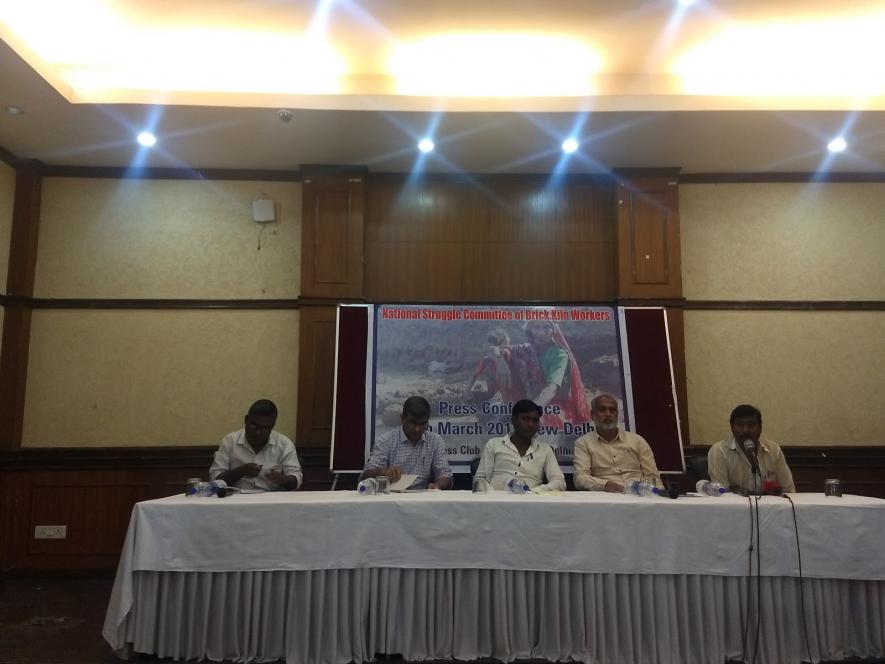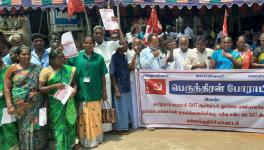‘Time to Free Brick Kiln Workers from Modern Slavery’

“I left studying when I was 10. My grandfather worked in a brick kiln so did my father just like I am doing now. This is our story of transgenerational poverty and violence that we have witnessed working in brick kilns,” said Manhar from Chattisgarh, currently working as a migrant worker in a kiln in Pathankot. There are about 12 million workers employed in brick kilns across India. Workers like Manhar are sourced through a vast network of contractors from remote rural pockets with concentration of poverty. While most of these pockets exist in North and Eastern part of the country, even the developed states of West and South have such pockets.
Speaking at the press conference of the newly founded National Struggle Committee for Brick Kiln Workers today in New Delhi, Madan Mishra of the organisation explained, “The root cause of this practice of modern slavery is primarily the recruitment process. Poverty stricken families are targeted by the agents of the brick kiln owners. By luring them to work for the whole season on the promise of advance payments, they are often trafficked into different states, further controlled by violence and abuse, leaving them with no alternative of survival but to work for the kilns.”
Manhar added, “About 200 families work on an average sized kiln at a time. The entire family is involved in the production process, even children as young as five.” The workers toil for over 12-18 hours per day, without any facilities for food, water and toilets. Sharing his experience in the kiln, he said, “The workers have to make the jhuggis themselves and have to pay for electricity bills for over 4 months. We are allowed to use 2 watt bulbs and manage in dimly lit ratholes.” A major cause of concern amongst the kiln workers is also the safety of women who are often targets of physical and sexual abuse. The increase in child labour in the kilns is also an alarming trend.
Also Read: Modern Slavery Is Alive and Thriving in India, Say Rescued Bonded Labourers
When one looks at the migration of workers, it becomes evident that the Interstate Migrant Workmen Act remains only on paper as the activities and abuse by middlemen go unchecked. Nearly all the workers deployed in brick kilns fall under the category of bonded labour as defined by the The Bonded Labour (Abolition) Act 1976 and every year hundreds of workers are released from bondage. Physical violence is common, sometimes leading to death. In an extreme instance, the hands of two workers were chopped off in Odisha in 2014, post which the Supreme Court took suo moto cognizance of the case. However, workers continue to face extreme forms of violence on the job. Majority of these workers comprise of historically deprived communities like Scheduled Caste, Scheduled Tribes, and most backward communities.
Discrepancies in Piece Rate Wages and Time Rate Wages
A key factor aiding the exploitation of brick kiln workers is the fixing of piece rate wages at very low levels that force workers to work round the clock and even deploy their children to make bricks. Even the state departments become partners in this exploitation process when they fix low piece rates without any scientific basis.
Statutory Minimum Wage rates for six states in North and West India are given in the table below. The Minimum wages are declared on a time rate as well as a piece rate. Four of the states have declared piece rate minimum wages while two have declared time rates.
| Sl | State | Piece rate per 1000 bricks | Time rate for semi skilled workers per month |
|---|---|---|---|
| 1 | Punjab | 626.95 | |
| 2 | Haryana | 502.95 | |
| 3 | Uttar Pradesh | 8443 | |
| 4 | Madhya Pradesh | 8435 | |
| 5 | Rajasthan | 233 | |
| 6 | Gujarat | 320.2 |
The table shows that piece rates have been fixed in a completely arbitrary manner. The piece rates in Haryana and Punjab are almost double the piece rates in Gujarat and Rajasthan.
How many bricks can be made in one day? In a time motion study carried out by Industrial Design Centre of IIT Bombay, the production of bricks by one male and one female working together was 1,300 bricks. For this, the male workers worked for 13 hours and female workers 9 hours. It amounts to almost one minute per brick. Production for an eight-hour day is 472.
If the daily wage rate is calculated using findings of the above study, then per day minimum wage for an eight-hour work day in Gujarat is Rs. 153 and Rs 110 in Rajasthan. This is much below the industrial daily wage rate for semi-skilled workers in these states that is Rs. 284 in Gujarat and Rs 237 in Rajasthan. Thus statutory minimum wages for brick kiln workers in these two states are fixed at half the level of time rates in these very states. This situation prevails for many other states as well.
Also Read: Indian Workers on Starvation Wage
Sudhir Kumar Katiyar of the committee said, “When it comes to the implementation of the laws one can see total lawlessness. Our focus is not just to rehabilitate people but to ensure systemic changes in the industry, which is why we are now demanding for the social security cover to be extended to brick kiln workers who do not even come under the ambit of the Factories Act. We are asserting that they be given a social security number and their fair compensation determined through a scientific method should be deposited in their accounts.”
With the upcoming elections, a majority of the workers away from their home state will also remain disenfranchised and will not be allowed to vote due to their continued migration. The National Struggle Committee for Brick Kiln orkers is now gearing up to campaign extensively by appealing to political parties and to unionise the workers for a major showdown in the coming months in the national capital.
Get the latest reports & analysis with people's perspective on Protests, movements & deep analytical videos, discussions of the current affairs in your Telegram app. Subscribe to NewsClick's Telegram channel & get Real-Time updates on stories, as they get published on our website.
























